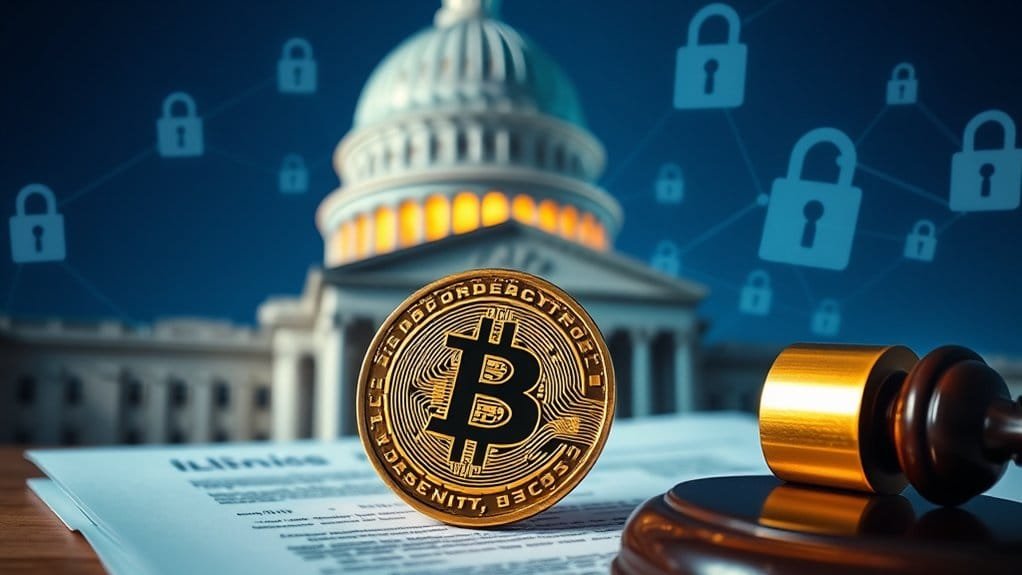Illinois Senate passed the Digital Assets and Consumer Protection Act with a 39-17 vote in April 2025. The legislation targets rampant crypto fraud that’s made Illinois the sixth-highest state for losses nationwide. SB1797 requires crypto businesses to register, pay $5,000 fees, and follow strict rules about customer funds. Senator Mark Walker’s bill forces companies to clearly disclose risks and fees. The days of anonymous crypto scammers may ultimately be numbered.

Dozens of Illinois residents fall victim to crypto scams every week. The numbers are staggering—over 1,900 complaints in 2023 alone, making Illinois the sixth-highest state for crypto fraud losses nationwide.
But lawmakers aren’t sitting around twiddling their thumbs anymore. The Illinois Senate just passed the Digital Assets and Consumer Protection Act (SB1797) with a 39-17 vote on April 10, 2025. About time, honestly. The bill aims to protect consumers from the Wild West of cryptocurrency by imposing actual rules. Imagine that.
SB1797 doesn’t mess around. It forces crypto businesses to register with the Illinois Department of Financial and Professional Regulation regardless of where they’re headquartered. Serving Illinois residents? You’re playing by Illinois rules now.
Illinois isn’t asking nicely—if you want crypto business from its residents, you’ll follow the rules or get out.
Companies will have to clearly disclose fees, risks, and insurance coverage to users. No more fine print nonsense. They’re also banned from using customer assets without permission—a practice that’s somehow been allowed until now. Unbelievable.
The legislation creates strict operational standards too. Customer funds must be kept separate from company coffers. Crypto businesses need to maintain secure environments and conduct risk assessments for tokens they list. They even have to provide toll-free helplines. Revolutionary concept: actual customer service.
This bill comes during a national debate over crypto regulations, with the Trump administration taking a more hands-off approach. Illinois seems determined to chart its own course, balancing consumer protection with industry growth. The bill, introduced by Senator Mark Walker, addresses the anonymous nature of cryptocurrency that often complicates fraud prosecution.
After clearing the Senate Executive Committee on April 4, the bill now heads to the House. If it passes there, Governor Pritzker could soon add his signature.
For a state ranking sixth in crypto fraud losses, this legislation might ultimately give scammers something to worry about. Pig butchering schemes and rug pulls have flourished in regulatory gaps. Now Illinois is trying to close those gaps—one strict rule at a time.
The bill also imposes a non-refundable registration fee of $5,000 for all digital asset businesses seeking to operate in the state, ensuring only serious players enter the market.
Frequently Asked Questions
How Will Individuals Report Suspected Crypto Fraud Under the New Legislation?
Under the new legislation, individuals can report suspected crypto fraud through mandated toll-free hotlines and live customer support systems.
Companies must provide these channels specifically for dispute resolution and reporting unauthorized transactions.
The law requires digital asset businesses to establish thorough fraud reduction programs.
Detailed transaction confirmations help consumers identify suspicious activity.
The IDFPR, as the primary regulator, can investigate reports and impose fines on non-compliant entities.
Pretty straightforward stuff.
What Penalties Do Crypto Fraudsters Face if Convicted?
Crypto fraudsters face a world of hurt if convicted.
Civil penalties can hit 75% of underpayments for intentional tax evasion.
Criminal penalties? Even worse. Fines, restitution to victims, and prison time await those caught running schemes.
Federal charges like wire fraud, securities fraud, and money laundering pack a serious punch.
Beyond legal consequences, their reputation gets trashed and employment prospects tank.
The digital Wild West has sheriffs now.
When Will the Legislation Take Effect if Passed?
If passed, the legislation includes a phased approach to implementation.
Initial measures would likely take effect shortly after the governor signs it into law.
However, crypto businesses get a generous runway—until January 2027—to fully comply with all regulations.
Basically, companies have years to get their act together.
The gradual timeline aims to balance immediate consumer protection with giving businesses time to adapt.
How Does Illinois’ Approach Compare to Other States’ Crypto Regulations?
Illinois’ crypto approach has teeth.
While California amended AB 1052 focusing on self-custody and payment protections, North Dakota’s HB 1447 tackles crypto-ATM fraud specifically.
New York went harder, establishing criminal penalties for crypto fraud.
Each state’s crafting unique solutions – no one-size-fits-all here.
Illinois falls somewhere in the middle, balancing regulatory oversight with industry support.
Not too harsh, not too soft.
Just right? Time will tell. What Is Bitcoin?
Will Exchanges Operating in Illinois Need New Licenses or Certifications?
Under SB1797, exchanges don’t need traditional “licenses” but must register with IDFPR.
It’s not just paperwork, though. They’ll need certifications for non-pre-approved digital assets, proving they’ve addressed manipulation risks.
Plus, they must disclose conflict of interest policies and conduct risk assessments.
Compliance isn’t optional. The $5,000 registration fee is just the beginning.
Annual renewals are mandatory, or enforcement actions await.
No shortcuts here. 7 Best Ways Cryptocurrency Benefits Small Businesses

